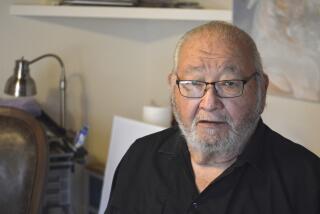A memoir rendered with skill but little substance
- Share via
THIS snapshot of a book focuses on a few years in the life of W.S. Merwin just before he becomes a known poet, long before he could arguably be referred to as one of the greatest American poets of the 20th century. Never having to retreat to the shelter of academia, he managed to thrive off his work alone. Merwin is now in his late 70s, and “Summer Doorways” is a look back at his youth.
One wonders why Merwin chose this period of his life for a memoir. With more than 40 books -- poetry, prose and some well-respected translations of poetry from the Latin, French and Spanish -- and a Pulitzer Prize to his credit, why not, for example, choose to write a memoir about a mature time of his career? There was 1950s Boston, when he was part of a group attached to poet Robert Lowell. Or his 1960s friendship with Sylvia Plath and Ted Hughes.
Then there was his anti-Vietnam War stance in the early 1970s. Or his midlife move to Hawaii, his discovery of Buddhism and an astonishing growth of environmental awareness in his work. Or perhaps a mix of all these, along with some insight into why he became a poet, or about poetry in general.
It is disappointing that there isn’t much in the book about poetry other than a few glimpses of Merwin beginning to attempt writing it, meeting other poets such as Richard Blackmur and John Berryman at Princeton where he studied and, later on, Robert Graves in Europe.
Merwin tells the reader that Berryman and Blackmur, after his parents, had more to do with forming his outlook than anyone else -- yet he only devotes three or four pages to discussing the men and tells little about how they helped form this outlook.
Although the writing in “Summer Doorways” is often rich and lucid, flawlessly and interestingly evoked, there is also an empty feeling upon completion, as if Merwin began to draw the mirror toward himself, then forcibly turned it toward other characters in the book in discomfort.
By the end, the young poet seems almost a cipher. The landscape of France and, later, Spain around him, the people flitting in and out of his life are written so well that it is hard to explain how he could write about himself so badly. Or for that matter, about his young wife, Dorothy, who seems to have been given the cold shoulder as soon as they were off to Europe. There are hints where the marriage is going, of course, but little depth as to why.
Wanting more Merwin to come out in the book isn’t an appeal for an ego-feast. The very act of writing a memoir is an act of the ego, though it doesn’t mean it must be egotistical. We arrive at the beginning with the narrator, a summer just a couple of years after World War II, about to board a ship bound for France, where he will be tutoring the 12-year-old son of the wealthy Alan Stuyvesant. Merwin had spent the summer before this tutoring Alan’s son Peter at the family’s New Jersey estate, learning to drive and devouring that ephemeral metamorphosis between youth and adulthood. We get glimpses of his time at Princeton, his marriage to Dorothy and some snapshots of his youth and his parents.
The book is far from a failure, its main pleasure being the elegant writing, as well as the focus on life just after World War II, before modern commotion, speed and intensity set in. A time of transatlantic steamers, prior to massive interstate systems; a more fluid and less hurried time in America and Europe.
Merwin also digs into a few characters extremely well, especially Alan Stuyvesant, an old-money, almost aristocratic American, a leftover from the country-club, Gatsby-esque Princeton of the 1920s, who seems to dissolve before the reader’s eyes into a drunken mess. From their meeting through the summer work agreement and on to Europe and more work, Alan is nearly the main focus. Yet after Alan’s accidental death, he’s entirely forgotten and we pick up new threads and new characters. Through all of this, Merwin fails to examine the other principal influences in his life in any great depth, especially the boy he is tutoring, his own wife and most notably the “character” Merwin himself. There seem to be more doors than doorways in this book, mostly getting shut when we’d prefer they be opened.
*
Michael Standaert is a regular contributor to Book Review. His first book, “Skipping Towards Armageddon,” will be published this month.
More to Read
Sign up for our Book Club newsletter
Get the latest news, events and more from the Los Angeles Times Book Club, and help us get L.A. reading and talking.
You may occasionally receive promotional content from the Los Angeles Times.









